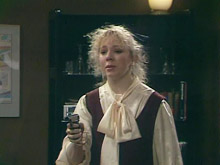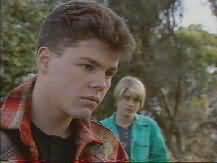|
.
Comment
> All Grown Up
by Ryan
So, the residents of Ramsay Street have been given the key to the door. The show that once struggled to make it to its first birthday has reached the grand old age of 21. But has the show we’ve grown up with done much growing up of its own?
What words spring to mind when we think of Neighbours? ‘Different’, perhaps – compare the sun-drenched Erinsborough to the grey drabness of EastEnders or antiquated cobbles of Coronation Street. ‘Gentle’ maybe, or ‘fun’ – ‘lightweight’, less kind critics might say. One word not likely to come to mind is ‘gritty’. If you want conflict and hard-hitting storylines, don’t head to Ramsay Street – and in many ways, that’s what makes the show special. Unfortunately, at times it’s what saw it descend into pure fluff.
Think of the glory years of the late eighties, and the storylines which spring to mind are happy moments such as Scott and Charlene and Des and Daphne’s weddings, Gail and Paul realising they really loved each other, or Jamie Clarke’s riverside birth. Comedy moments would probably feature heavily in the memories of most fans – who could forget Harold accidentally subjecting Mrs Mangel and Eileen to a porn film, or Madge separating a feuding Harold and Lou with a bucket of water? Great fun, but hardly the stuff of high drama. But look back more closely and you’ll see Neighbours wasn’t all rows about pancake contests in its early years.
|

|
When Terri Inglis pitched up in Ramsay Street, viewers were expecting little more than the comedy clash of chauvinistic Max Ramsay working with a female plumber’s mate. Who’d have thought that within months she’d have committed murder and tried to bump off husband Paul into the process? Pretty dark territory for a supposedly lightweight show. Of course, this could have been a desperate ploy by Network Seven to save a struggling soap by upping the ante. However, that wouldn’t explain Terri’s subsequent suicide after the move to Network Ten, or her deranged ex-boyfriend kidnapping Helen. Elsewhere we had Scott Robinson being accused of sexual assault, and the revelation that Charlene had caused her own miscarriage at sixteen with the old ‘gin and hot bath’ trick. So the big question is, what changed?
One highly probable answer to that question is ‘the BBC’. When Michael Grade discovered Neighbours had a huge teen following and moved it to teatime, the BBC became a major player in the show’s progress. With viewing figures in the UK reaching levels that almost matched the entire Australian population, Grundy became more concerned about pleasing the BBC than Network Ten. Certain elements of the show considered controversial subtly disappeared during the late eighties. Ramsay Street’s golden couple, Scott and Charlene, were almost asexual even after their marriage. Former convict Henry Ramsay showed no signs of having been a ‘bad boy’ and played the role of clown instead. Suddenly even Max Ramsay’s opening line from episode one, ‘what are you gonna do about those bloody neighbours of yours?’, sounded racy compared to the dialogue we were getting.
The image of Neighbours as safe and sweet had been further enhanced by the arrival of Home and Away on UK screens. Within its first few months it covered rape, arson, teenage pregnancy and euthanasia. Madge dropping a cake on the floor of the Coffee Shop seemed somewhat tame by comparison. Whether Home and Away’s edgier plots contributed to a decline in the popularity of Neighbours is debatable; the loss of Scott and Charlene and other key characters was probably far more damaging. However, the contrast set the tone for the progress of the show; for daring storylines, it was a case of ‘switch to ITV’.
|

|
Although the highs of the eighties were over, Neighbours still remained popular, but whether it was growing up with its audience was another matter. As the teens of Ramsay Street grew up and moved to Brisbane, teen viewers aged and left with them, and both on and off screen, a new generation took their place. As the nineties progressed, Neighbours relied increasingly on comedy moments. When the show did try to be controversial, it seemed oddly out of place. Remember Cody Willis worrying that boyfriend Michael Martin didn’t want to sleep with her? Annalise confided that a similar thing had happened to her, but her boyfriend ‘turned out to be gay’. Er, hang on a mo! Surely the word ‘gay’ doesn’t exist in the innocent world of Erinsborough? Even more shockingly, the real reason Michael didn’t want to sleep with Cody was that he thought he could have AIDS. Neighbours doing AIDS? It seemed about as likely as a murder in Postman Pat. Unsurprisingly the plot was not a success, mainly because viewers knew from the start Neighbours producers would never have the courage to give a full-time character AIDS. Similarly, when Grundy actually introduced a gay character in the shape of builder Macca, he didn’t get to actually move into Ramsay Street and have his own storylines, and after teaching Doug Willis a quick lesson about tolerance, he disappeared into the great blue yonder (or possibly to Anson’s Corner).
Of course, there were some darker moments in the nineties for Neighbours; Fiona Hartman ruthlessly leaving Jim to die and Cody being fatally shot by drug dealers spring to mind. But for every one of these, there were several more ‘Receptionist of the Year’ plots to bog down the action. Even the one big story that did grab viewers’ attention, the famous Karl and Sarah affair, was devoid of any mention of the dreaded S-E-X. Again, the BBC must take their share of the blame, with sex-related storylines involving Mal and Danni and Billy and Melissa falling victim to the censors. But sex is far from the only thing that makes a show ‘adult’. For years too many bland characters were introduced, with any vaguely controversial subjects ignored. With the 21st Century just around the corner, Neighbours had to come up with something that would help it move into a new millennium. That something was a doctor by the name of Darcy Tyler.
|

|
It wasn’t so much the character of Darcy that gave Neighbours an extra edge, but what he represented. For the first time in years, Ramsay Street had a full-time resident who had a genuinely hard, ruthless side, whose bad behaviour would go further than a minor dispute over a garden boundary. It wasn’t quite a return to the halcyon days of Paul Robinson, but it did make Erinsborough a less than perfect place once more. A villain sticking around had far more long-term impact than the usual nasty piece of work who would pop up for a few weeks, before getting his just desserts and leaving. While Darcy did get his comeuppance in the end, it took years rather than weeks, and was all the more effective for it.
Arguably at points in the early 21st Century Neighbours tried a bit too hard to grow up, like a stroppy teen desperately wanting to be taken seriously. How did Lou and Toadie end up involved with the Erinsborough branch of the mafia? More to the point, why were we supposed to believe there actually was an Erinsborough branch of the mafia? Like Michael Martin’s AIDS scare, it seemed oddly out of place. Darcy’s arrival had added a far more subtle adult tone more suited to a show like Neighbours. Luckily, someone in the casting department seemed to realise this, and after Ramsay Street lost its bad boy, it gained its first bad girl in a long time in the shape of Izzy Hoyland.
|

|
A hugely successful addition to the cast, Izzy is probably the first true full-time bitch on Neighbours. Not a Sue Parker or Geri Hallett type bitch, who would just turn up periodically and spread a few snide rumours, but a ruthless, manipulative, stop-at-nothing bitch; the kind normally reserved for American soaps (and Emmerdale!) Despite this, Izzy manages to be three-dimensional – she shows genuine love for her niece and nephew (although is not averse to using them for her own needs), and the irony that she has actually grown to love Karl allows viewers to feel a kind of sympathy for her. Izzy also put sex back on the map for Neighbours, leaving us in no doubt of what she was up to with young Jack Scully.
Of course, to talk about Neighbours taking a more adult tone, there’s one character we can’t ignore: Lana Crawford. For the first time in its twenty-year history, Neighbours had a gay character that wasn’t just passing through, who could make a genuine impact. The fact that she caused a previously ‘straight’ character to question her own sexuality was even braver territory. Okay, so Grundy weren’t quite brave enough to use male teens in the storyline – why scare male viewers when you can titillate them? – but it was definitely a step forward.
|

|
Darcy, Izzy and Lana helped pull Neighbours from a mire of bland niceness it had been stuck in for several years. But if you want to see the point where the show truly came of age, just watch the 2004 finale. As sad as it was to see some of the most famous sets in the show’s history succumb to the flames, the fire heralded the beginning of a new era, with a little help from one of the stars of the old one. Yes, the original bad boy of Neighbours was back, and teaming Paul Robinson up with Izzy proved a masterstroke. There was conflict on Ramsay Street once more, and even the more staid residents began to veer into darker territory. Who’d have thought in the days of Marlene’s gnome going missing that we’d one day see drama of the likes of the recent plane crash? That producers would dare to wipe out an entire family? All this with the once fluffy Sindi Watts becoming a psychotic prostitute in the background…
For some, Neighbours would need more sex and swearing to become a genuinely ‘adult’ show. But to me, there’s something far more adult about a show that doesn’t rely on shock tactics, but can take you to dark places whilst still retaining a sense of humour. It’s Alex Kinski getting a tattoo while Paul wrestles with the idea he killed the Bishops. It’s Dylan Timmins hiding his modesty with a giant jar of gherkins in the same episode as Elle Robinson spiking her dad’s girlfriend food with drugs – the kind of teen revenge tactic not seen since her aunt and namesake made nuisance phone calls to Zoë Davis. This is what makes the new era of Neighbours fun without fluff. Happy 21st birthday Neighbours – you’re all grown up.
Back
|

